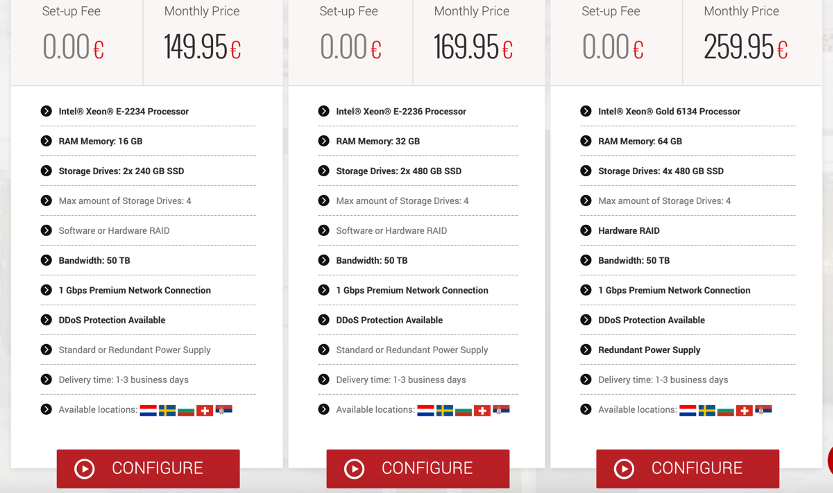Your website is the most important building block of your internet presence. Its performance, on the other hand, determines your online success. Fortunately, there’s something you can do to increase your chances of winning: Choose a high-performing web host!
The web hosting provider you choose determines how often you stay online and the time it takes to load information on your website. Thereby it affects user satisfaction and conversion rates.
Remember, the higher the performance metrics, the better the overall performance of your website. On the other hand, downtime and slow speeds are your worst enemies. But it doesn’t end there.
Keep reading to explore the key performance features every high-quality web host should have.

Source: AltusHost
A 99.9% Uptime Guarantee
Uptime is perhaps the most critical performance feature for any web host. It refers to the consistency of your host’s server and how long it stays up and running. Web host servers are supposed to run 24/7 because anybody can visit any of the sites hosted on the servers anytime.
If your web host servers have 95% uptime, it means your website experiences a 72-minute downtime every day. This “short” window can lead to a significant loss of traffic and a general lack of trust in your website and brand.
Ideally, a web host should have 100% uptime. However, maintenance, third-party integrations, human error, and other factors make it impossible for any server to achieve 100% uptime. So, the next best thing is 99.9%.
Remember that any top-notch web host, including AltusHost, promises at least 99.9% uptime for its customers. So, don’t settle for less.
A 99.9% uptime guarantees that website servers only experience about 86.44 seconds of downtime daily: this network gap is undetectable, and visitors will always have a smooth user experience on your website.
Source: https://www.altushost.com/
Superfast Server Response Time
Server response time, also known as Time to First Byte (TTFB), is the time it takes for a server to receive, process, and start sending data back in response to a request.
If a user wants to browse your website and it is taking forever to access, best believe they will bounce and may never return. Ideally, your server speed should be between 100ms to 200ms; the lower, the better. Studies show that for every 100-millisecond delay in website load times, there can be a 7% reduction in conversion rates. If your server response time is above 200ms, Google considers it slow.
Another vital part of the speed metric is the loading time. While server response time refers to the initial server response, loading time refers to how quickly content on web pages loads. The loading time of a website depends on the response time. A faster response time means a faster loading time.
Loading time should be between 1 to 3 seconds. Anything above that will result in a higher bounce rate and reduced traffic over time.

Source: AltusHost
Scalable Bandwidth and Storage
Bandwidth is the amount of data that can be transferred between a browser and a web server in a given time frame. It is usually measured in bits per second (kilobits, megabytes, gigabytes).
When you start a new website, you don’t need much bandwidth because your traffic is minimal, and you have fewer monthly visitors at this level. However, as your website grows and monthly visitors increase, you need more bandwidth to maintain optimal performance.
If you sign up for a shared hosting plan on most platforms, you get unlimited bandwidth. However, the term ‘unlimited’ in this context is somewhat misleading. Web hosts only label it so because other blogs/websites are hosted on the same servers, and the allotted bandwidth capacity is often enough to cater to all of them.
Unlimited bandwidth is cheaper for both the web hosts and the website owners, which makes it appealing to new websites, personal blogs, and websites with minimal traffic.
However, once a website starts attracting a substantial number of visitors—say around 10,000 per month—the concept of ‘unlimited’ bandwidth falls short. It then becomes imperative to upscale the bandwidth capacity. Thereby, it’s essential to choose a web host that offers scalable plans in terms of bandwidth to accommodate this growth.
Here is where VPS or dedicated servers come into play. These hosting plans come with large, exclusive bandwidth capacity (up to 50TB monthly on AltusHost), so you can service your customers exclusively and avoid high-traffic timeout problems.

Source: https://www.altushost.com/dedicated-servers/
Similarly, scalable SSD storage is equally important. As your website grows, you will need more storage space for your files, images, and databases. A scalable storage option allows your website to grow without worrying about running out of space, thus ensuring a smooth user experience.
24/7 Customer Support
Websites may occasionally experience downtime, plugin issues, security breaches, and similar performance issues. Fortunately, a high-end web host will solve these technical issues promptly and prevent traffic loss.
Opt for a web hosting provider that can answer any questions about their operations and provide relevant help when needed. Moreover, strive towards a web host with different ways of providing customer support, including live chat, phone calls, email, knowledgebase, or ticket support.
Customers usually prefer live chat as it comes with 24/7 availability and ensures immediate assistance. At AltusHost, we offer live chat, ticketing, and phone call support; enough to meet anyone’s technical support needs. Feel free to get in touch with us for any concerns or inquiries!

Source: freepik.com
Automatic Daily Backups
Automatic daily backups don’t affect your website performance directly. However, they ensure that you are right back where you left off if you ever lose important website files. Website files include your codebase, emails, content, and all other parts of your website.
If your website crashes for any reason, and these files are not backed up, you lose your internet presence. You will have to start rebuilding again, and all your previous achievements and high website performance metrics will become irrelevant.
Consider this: 68% of businesses that experience a data loss will go out of business within a year, and 93% within five years. That’s why a high-quality web host should guarantee your website’s long-term performance by automatically and consistently backing up its crucial files. When choosing a hosting provider, make sure they offer automatic daily backups as an integral part of their service to protect your investment and online success.

Source: https://www.altushost.com/remote-backups/
Wide Server Network & CDN
Server locations are also crucial to the performance of a website. The closer your website visitors are to the server, the faster the loading speed of your web pages. This is because there are lesser internet connections involved in the process, and browsers can receive data from the servers faster.
Thereby, if your target website visitors are in a particular area, say Europe, for example, a web host with European data centers is a perfect choice. But what if you want to extend your reach to a global level? Here’s where a Content Delivery Network (CDN) comes into play. It allows you to target a global audience even if your origin server is not close.

Source: https://www.altushost.com/europe-data-centers/
Extensive Security Features
A high-quality web host should come with extensive security features that protect your website from malware, phishing, cyberattacks, DDoS attacks, etc.
One of the most important security features is the SSL certificate. SSL certificates secure your website by encrypting the data transferred between the server and the web browser. This prevents hackers from gaining access to information on the website, and it also allows users to trust your website more.
On AltusHost, you can get advanced spam protection to help you secure your website from spam, virus, phishing, and malware attacks. This security feature enables you to save time by identifying spam and emails so you don’t compromise your website by interacting with them. Moreover, we include a free SSL in each of our hosting plans!
Conclusion
Your web hosting provider plays a pivotal role in your website’s success. It directly impacts your online presence, including uptime, loading speed, and security. The key performance metrics to consider include uptime guarantees, server response time, scalability, customer support, automatic backups, server network, and security features.
By choosing a high-quality host that excels in these aspects, such as AltusHost, you ensure your website is in safe hands, helping you achieve your online goals efficiently and effectively. Sign up with us!



